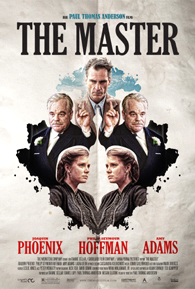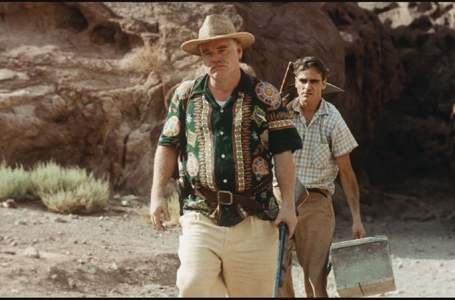
Instead, Paul Thomas Anderson's follow-up to There Will Be Blood is another piece of Americana, another cinematic essay about the peculiar passions, obsessions, and madness particular to a historical period. It is more useful to see The Master as an evocation of the immediate post-WWII era, where a shell-shocked and traumatised generation of Americans who, having survived the poverty of the Great Depression and the destruction of warfare, chose a life of predictability and conformity.
Master storytellers like Sam Mendes (American Beauty, Revolutionary Road), Tim Burton (Edward Scissorhands), and others make films about suburban angst, recreating on film their generational antipathy towards the choices their parents made. Where the freedom to live in order and conformity was gratefully seen by their parents' generation as the rewards of winning a just war, these filmmakers instead grew up chafing against the stultifying dullness and narrow-mindedness of suburbia.
Instead of a roman a clef, we suggest that this film is more of an allegory of post-war America. Joaquin Phoenix as Freddie Quell is the Everyman who returns home scarred from WWII, a picaresque rascal who settles down with a job and a gal every so often, but just as often getting undone through drink and anger management issues. It is this lack of centring or hollowness at the centre that typifies the war generation's post-war quest for belonging, certainty, acceptance — all of which seem tantalisingly within reach and on offer from Lancaster Dodd, the polymath scientist and philosopher played by Hoffman.
Much of the film can be described as a long series of conversations between Quell and Dodd, between a questing Everyman and a Master offering a path, a vision, a Cause (which incidentally is the name of the analogue of Scientology in this film, for viewers who still insist on reading it as a roman a clef). There is a battle of wills, of mutual submission, of a curious symbiosis between the out of control rogue and his mentor figure, who ultimately need each other in order to define themselves.
And like a road movie, the film takes us cross-country through America. There is a leisurely cruise to New York on a private ship, an extended stay in a suburban home, and a convention for the Cause in a desert town. Criss-crossing states and cutting across social classes, Anderson's film makes palpable the obsession for certainty and belonging that had infected the passions of an entire generation and drove some to the soothing balm of a community, and others to madness and despair.
Like his predecessor in There Will Be Blood, Joachim Phoenix grants an electric performance as a man almost literally bent out of shape by his inner demons. His face twisted perpetually in a grimace, Phoenix stumbles, limps, and lurches his way across the screen as though the emotional damage must somehow manifest itself painfully in the body. Hoffman, I contend, has the more difficult part. His is not the shameless, greedy conman of L Ron Hubbard, Messiah or Madman?, but an EveryGuru figure whose gift is the ability to be seen as right by most people, and curse is the realisation that he's not the guru he's made out to be. He is not the Mentor that the Rascal seeks, but is sought out nonetheless and cajoled into the role, then forced to maintain it out of fear of losing that undeserved nobility.
The Master is a subtle and beautiful film that is well worth the watch.












 列印版本
列印版本


















讀者回應
搶先發表第一個回應吧!
請先登入再使用此功能。